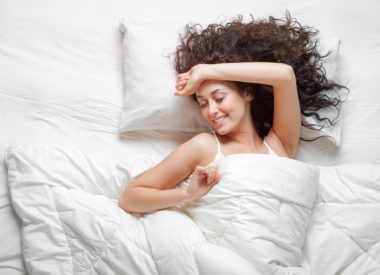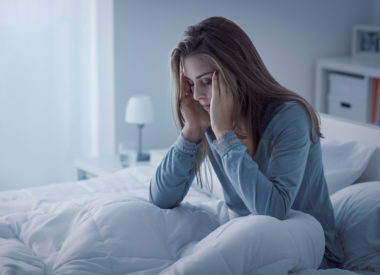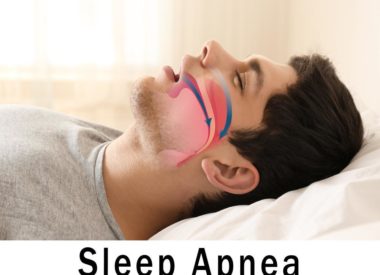Cant Sleep? Common Causes and Reasons
Do you ever find yourself complaining, Im having trouble sleeping or I cant sleep? If so, you’re not alone. In fact, you’re not even among a small but distinguished group of unfortunates. According to the American Sleep Association (ASA), a pretty massive number of adults in the U.S. are bad at getting enough shuteye.
Here are a few statistics on sleep that may surprise or even shock you:
- About 35% of American adults sleep less than 7 hours of sleep per night. . . even though the general recommendation for good health is 7 to 9 hours.
- Almost 38% of adults say they’ve fallen asleep during the day without wanting to–in the last month!
- 60% of adult drivers report a recent memory of driving drowsy, and 37% have fallen asleep while driving.
Does any of this sound familiar to you? If so, you’re likely one of millions of adults who are chronically sleep-deprived–and possibly putting yourself and others (and your job!) at risk every time you drive or show up somewhere without feeling rested.
The question is: if you’re not under-sleeping on purpose, and in fact want to sleep more, why isn’t it happening? Why cant you sleep?
Why You Cant Sleep: Non-Medical Reasons
If you cant fall asleep or stay asleep, look at your lifestyle and sleep environment: are one or more non-medical factors in your life contributing to your sleeplessness? Perhaps you’re stressed, or maybe your bedroom is not protected from light, noise, messiness, strange smells, or other environmental factors.
Some common lifestyle and environmental causes of sleep difficulty include the following.
Poor sleep hygiene. Sleep hygiene doesn’t mean clean sheets and blankets (though thats an important aspect, too). Rather, it’s a term used to describe a set of practices you can employ to help promote better sleep. Many people who have trouble sleeping have a problem with one or more aspects of sleep hygiene without realizing it. Often, correcting these problems and embracing better habits can make falling asleep and staying asleep much easier. For example, good sleep hygiene habits include:
- Keeping a consistent wake-up time and bedtime. Generally, the wake-up time is the more important of the two. However, both should be roughly the same every day–even on weekends. If you’re aiming for 7 hours of sleep per night, calculate your bedtime based on either your necessary wake time or on your body’s natural wake time. If you need to be up at 7:00 a.m., for example, you should be asleep by midnight. (For obvious reasons, shift workers often struggle with this aspect of sleep hygiene.)
- Branding the bed for sleep and sex. Try to avoid creating any associations in your mind between the bed and activities other than sleep and sex. This means no working in bed, for example. Try to make the bedroom off-limits to any activity you might associate with anxiety.
- Winding down before bed. Take the time to disengage from stressful activities in the evening. Transition your mind and body from your alert mode into sleep mode. Relax. Relaxation means different things for different people. Find what works for you (reading a novel, gently stretching, drinking warm milk, taking a bath, dimming the lights, etc.). Think of this time as a no-demands, no-stress time when you’re not allowed to think or talk about anything stressful or deadline-oriented.
- Dimming the lights and quitting the screens. Too much light–especially the short-wavelength blue light we get from digital screens–triggers the body to suppress the sleep hormone melatonin. Melatonin is what makes you sleepy, however. So if wakefulness at night is a problem for you, start dimming your lights and divorcing yourself from blue light-emitting devices at least an hour before bed. If you read in bed, try a book light rather than a bedside lamp. If you can, stop watching TV early, and get off smartphones, computers, and tablets.
- Keeping your room cool and quiet. A hot room or a very cold room can each disrupt your sleep patterns. The National Sleep Foundation recommends a room temperature of between 60 and 67 degrees. Make whatever adjustments you need to make to achieve this. The same goes for noise level. Muffle noises that may be keeping you awake. If you have to, wear earplugs or turn on a white noise machine.
- Avoiding stimulants and alcohol. Caffeine has a very long half-life (twelve hours), meaning you need to stop drinking it pretty early in the day to guarantee its out of your system by the time you go to bed in the evening. Nicotine and vaping involve stimulants that can keep you from falling asleep, or which may fragment your sleep during the night. And alcohol dehydrates the body and can affect insulin levels. To sleep better, its best to avoid all of these substances, especially in the second half of your day.
- Getting plenty of exercise (at the right time). Daily exercise promotes better sleep, but for some people, the time of day makes a difference, too. You may find you drift off to sleep better if you do some light exercise (like yoga) right before bed. Some people sleep best at night if they work out first thing in the morning. Some people get a sleep benefit from mild daily exercise, like a 20-minute lunch walk; others sleep best when they enjoy a rigorous workout like a soccer game or a one-hour gym regimen. Experiment to find out what works best for you.
- Getting enough natural daylight. Our circadian rhythms (how the body regulates the sleep/wake cycle) depends on daylight. In the winter especially, many people struggle with sleep because they wake up in the dark, spend all day under fluorescent lights at work, then drive home in the dark. These conditions may confuse your body’s signals. If you can, get outside in natural daylight for a few minutes every day.
- Eating right. A balanced diet matters, but its just as important to avoid eating too many heavy or spicy foods late at night because these can upset digestion, disturbing your sleep.
- Too many daytime naps. Restricting the bulk of your sleep to one long session in the evening is the best way to promote a full nights sleep. Theres nothing wrong with daytime napping, but if your mid-day rest session is too long (longer than 20 minutes), it may be interfering with your body’s ability to get sleepy at when you really need it to. Experiment with different length naps at different times of day, or consider cutting the naps out completely.
Pets (or kids) in the bed. This can fall under the category of sleep hygiene, too. Your pets may be causing you allergic responses with your realizing it, or their nighttime movements (or sleeping on your head) may be disturbing your rest. The same can go for small children.
Allergens. Allergies and the subsequent reactions to them–like congestion, sneezing, coughing, and headaches–may be disturbing your sleep without your realizing it. If you have known allergies, keeping your bedroom clean and free of dust, pollen, and pet dander is critical. Wash your bedding often, make sure its hypoallergenic, and take measures if you can to filter your air.
A snoring or restless partner. If you sleep with a bed partner, this persons nighttime behaviors may be disturbing your sleep. Ask the other person to have consideration for your sleep by coming to bed quietly. If they snore or show signs of a disorder like restless leg syndrome, sleep talking, sleep walking, sleep screaming (it happens), or even sleep sex, their problems may be making it tough for you to get good quality rest, too. For your own health and theirs, talk to your partner about whether she or he has a sleep disorder.
Why You Cant Sleep: Sleep Disorders
If you’ve tried controlling your environment and practicing good sleep hygiene and you still cant sleep, it may be time to talk to your physician about having a sleep study done to isolate your specific issue. You could have a sleep disorder thats either preventing you from falling asleep or preventing you from feeling rested when you awake.
A sleep study can help to determine if you have:
- Insomnia, either primary (on its own) or secondary (caused by an underlying medical issue). Insomnia is widespread and is the most likely culprit if you find you cant fall asleep or if you wake up in the middle of the night and cant get back to sleep.
- A circadian rhythm disorder, which may prevent you from feeling sleepy when you want or need to.
- Sleep apnea, which may wake you many (even hundreds) of times in the night.
- Some other sleep disorder (such as REM sleep behavior disorder or parasomnias ) which may be causing fragmented or poor quality sleep; an estimated 50 to 70 million Americans have a sleep disorder, according to the ASA.
If you think that you might suffer from Insomnia, please reach out to Sound Sleep Health in Seattle today! Our sleep disorders specialists are experts in addressing, diagnosing, and treating insomnia!
Call Sound Sleep Health at (425) 279-7151 .



